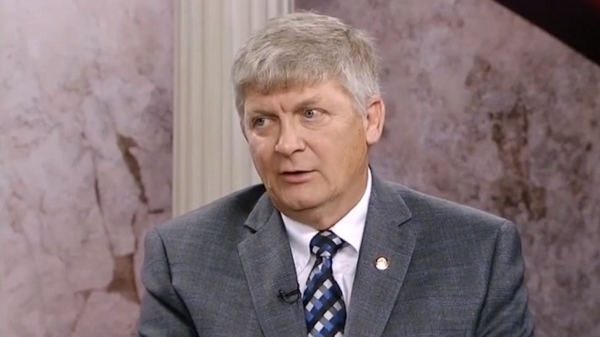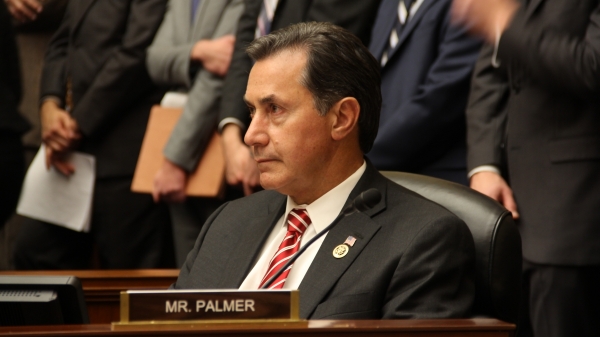The budget proposal passed by House Republicans on Thursday, titled the “One Big Beautiful Bill Act,” would seriously reduce health insurance coverage in Alabama, according to several nonpartisan reports.
On May 20, before a round of last-minute amendments was approved, nonpartisan health policy organization KFF estimated the bill would render around 53,000 more Alabamians uninsured. And if the current version is passed, which allows the ACA enhanced premium tax credits to expire, KFF placed the number of Alabamians that would be left without healthcare at around 170,000.
Most of the cuts in healthcare funding would take the form of reducing spending on Medicaid, the United States’ health insurance program for low-income households, by $625 billion over ten years. This cut would largely be due to imposing novel work requirements on people who receive Medicaid as a result of the expansion of the program by the Affordable Care Act. States would also be required to establish and verify recipients’ eligibility more often.
As a result of the Statutory Pay-As-You-Go Act of 2010, the budget could also trigger an automatic 4 percent cut to most Medicare spending due to trillions in lost tax revenue, drastically increasing the federal deficit. The Congressional Budget Office estimated this would mean a cut to Medicare of “$490 billion over the 2027–2034 period.”
Speaker of the House Mike Johnson, R-Louisiana, maintains that claims the bill would cut Medicaid are “misinformation.” In a recent CNN interview, he explicitly said Republicans “are not cutting Medicaid in this package.”
Alabama Congressman Mike Rogers also stated shortly after the bill was passed that it “delivers real results while continuing to support our most vulnerable,” pointing to a new adoption tax credit he had supported.
However, the Congressional Budget Office estimated that the changes to Medicaid are likely to leave over 10 million people nationwide off of the program by 2034, with almost 8 million being left totally uninsured.
During a press call last week, Allison Orris, director of Medicaid policy for the Center on Budget and Policy Priorities, compared the proposed new work requirements to ones implemented in the state of Arkansas in 2018 and 2019.
She said that “even though there were a number of exemptions for people with disabilities, for people with chronic conditions, for certain parents, people still lost coverage in Arkansas and the exemption process didn’t work.” Orris then declared that House Republicans’ work requirements are “even worse” than the ones tried in Arkansas.
Effects of the proposed changes to Medicaid, however, are likely to vary significantly with how much state governments are willing to use their tax dollars to replace federal funding, as well as when and how stringently states would enforce the new work requirements.
As one of only a few states that has not expanded Medicaid, Alabama appears almost certain to have a conservative response to any federal cuts to social safety net programs. During the most recent legislative session, state Sen. Arthur Orr, R-Decatur, already introduced two bills to further restrict eligibility for SNAP and Medicaid, but they failed to pass before sine die adjournment.
While the budget passed by the House would balloon the federal deficit, increasing federal debt by as much as $3.3 trillion by 2034, Republican politicians maintain that changes to Medicaid and the Supplemental Nutrition Assistance Program are needed to both get people employed and reduce federal expenditures.
Secretary of Health and Human Services Robert F. Kennedy Jr, Administrator of the Centers for Medicaid and Medicare Services Mehmet Oz, and two other Trump administration officials argued in an opinion piece in The New York Times earlier this month that work requirements are now a necessity.
“For able-bodied adults, welfare should be a short-term hand-up, not a lifetime handout,” they wrote. “But too many able-bodied adults on welfare are not working at all. And too often we don’t even ask them to. For many, welfare is no longer a lifeline to self-sufficiency but a lifelong trap of dependency.”
In a Sunday interview on CBS News’ “Face the Nation,” Mike Johnson told reporter Margaret Brennan that “there’s a moral component to what we’re doing.” He emphasized that people who don’t work despite being able to are “cheating the system.”
Alabama Senator Tommy Tuberville recently made a similar argument during a May 12 appearance on Fox Business Network’s “Kudlow” where he said people living off of social safety net programs has “got to be over with.”
But experts like Matt Bruenig of the People’s Policy Project and political science professor, Anne Whitesell, say that data shows there are very few able-bodied adults on programs like Medicaid and SNAP who could be working and aren’t already.
“Given past experience with work requirements, it is unlikely [savings on Medicaid] would come from Americans finding jobs,” Whitesell writes. “My research suggests it’s more likely that the government would trim spending by taking away the health insurance of people eligible for Medicaid coverage who get tangled up in red tape.”
Alabama Arise Executive Director Robyn Hyden also stated in March that “the data and the reality show that expanding access to Medicaid increases labor force participation in the states that decide to expand this critical program.”
Alabama’s two Democratic members of Congress, Terri Sewell and Shomari Figures, have repeatedly criticized the proposed cuts. Sewell proposed an amendment on Wednesday to increase the ACA tax credits that the current bill allows to expire. Her amendment was not adopted.
Having already passed the House, the One Big Beautiful Bill Act now needs to be approved by the Senate before it can be signed into law. While a reconciliation package only requires a simple majority to pass, the budget proposal may not sail through the chamber as is.
Missouri Senator Josh Hawley has repeatedly stated he won’t support further cuts to Medicaid, while budget hawks like Senators Ron Johnson, R-Wisconsin, and Rand Paul, R-Kentucky, say they believe it would increase the deficit by too much.
“I want the Senate and the senators to change, you know, to make the changes they want,” President Trump told reporters on Sunday. “And we’ll go back to the House, and we’ll see if we can get them.”

















































